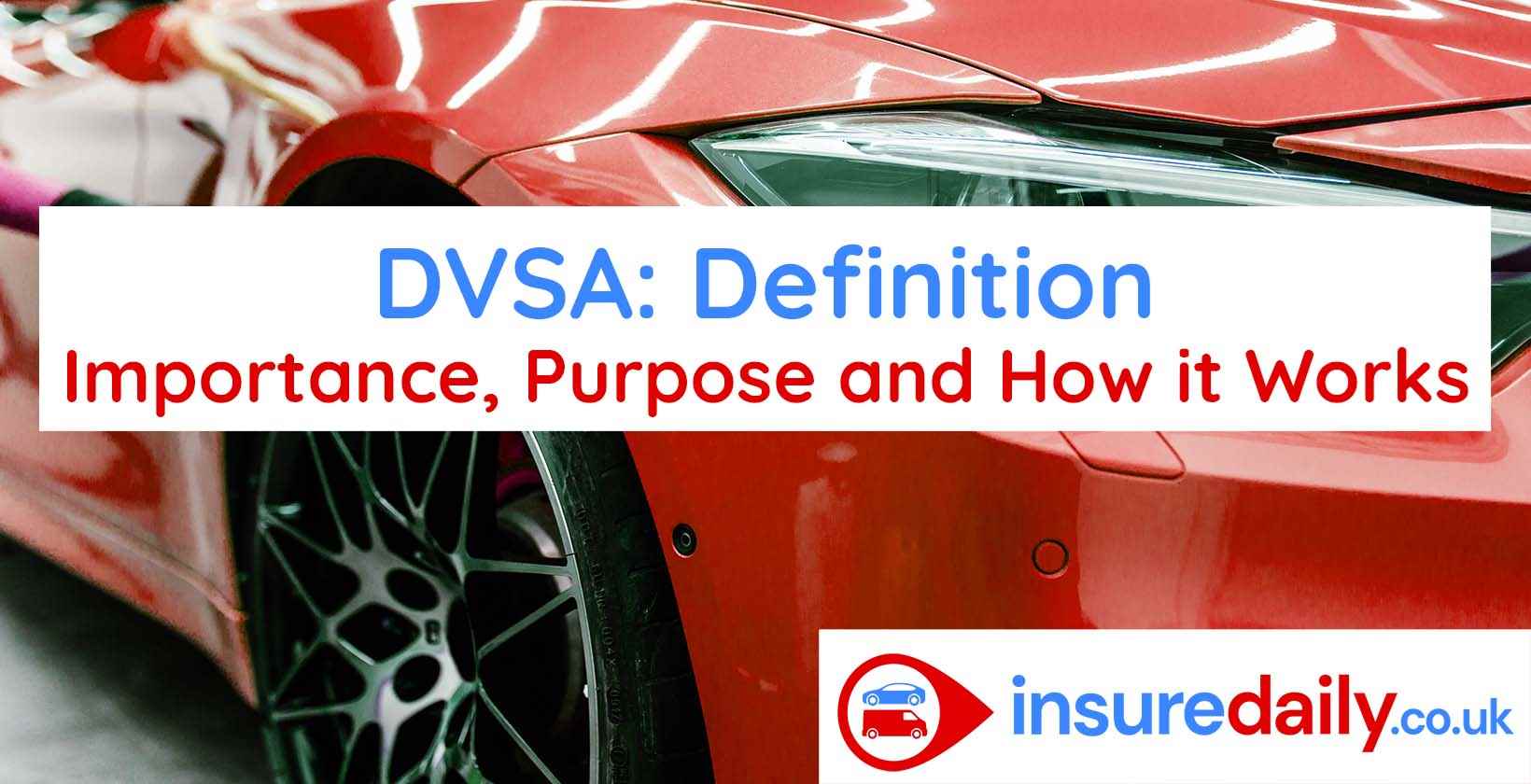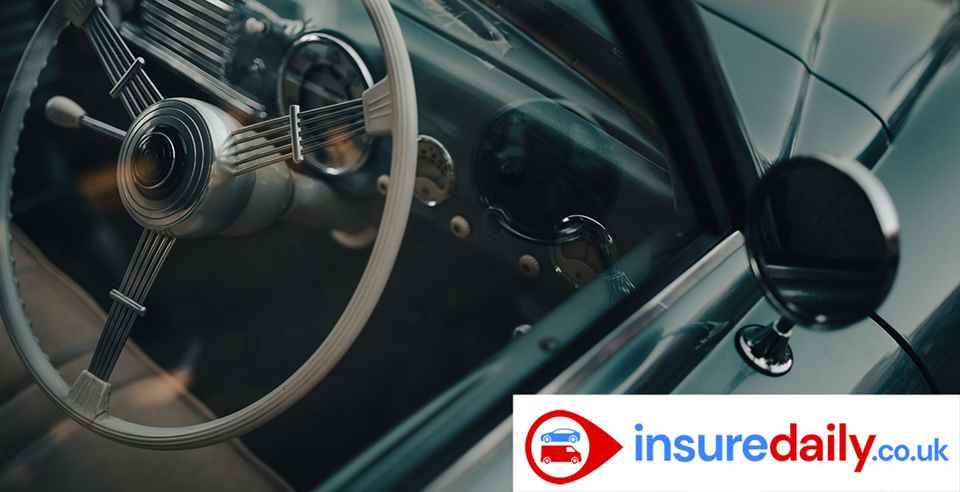DVSA: Definition, Importance, Purpose and How It Works

The DVSA (Driver and Vehicle Standards Agency) is a government agency in the UK responsible for maintaining and enforcing standards related to drivers and vehicles. It operates as an executive agency under the Department for Transport.
The DVSA's primary purpose is to enhance road safety by ensuring that drivers and vehicles meet the required standards. It achieves this through various activities, including conducting driving tests, setting standards for driving instructors and training schools, overseeing vehicle testing and inspections, and regulating commercial vehicle operations.
The importance of the DVSA lies in its role in promoting safe and responsible driving practices. By conducting practical driving tests, the agency ensures that drivers possess the necessary skills and knowledge to operate vehicles safely on the roads. The DVSA also sets and enforces standards for driving instructors and training schools, which helps maintain the quality and professionalism of driver training.
Additionally, the DVSA is responsible for regulating vehicle testing and inspections, which helps ensure that vehicles are in roadworthy condition. This contributes to safer roads and reduces the risk of accidents caused by mechanical failures or faulty vehicles.
The DVSA's work is essential in maintaining public trust and confidence in the driving and vehicle industry. By setting and enforcing standards, the agency ensures consistency and accountability in the industry, protecting the interests of both drivers and the general public.
To carry out its responsibilities, the DVSA collaborates with various stakeholders, including driving instructors, training schools, vehicle manufacturers, and testing centres. The agency also provides resources and information to the public, including guidelines for learning to drive, road safety advice, and updates on regulatory changes.
In summary, the DVSA is a government agency in the UK that plays a vital role in promoting road safety, maintaining vehicle standards, and regulating the driving industry. Its work is crucial in ensuring that drivers and vehicles meet the required standards, thereby reducing the risk of accidents and promoting responsible driving practices.
What is DVSA?
The Driver and Vehicle Standards Agency (DVSA) is an executive agency of the UK government that focuses on maintaining and enforcing standards related to drivers, vehicles, and road safety. It was established in 2014 through the merger of two predecessor organisations: the Driving Standards Agency (DSA) and the Vehicle and Operator Services Agency (VOSA).
The history of the DVSA begins with the formation of the DSA and VOSA. The DSA was responsible for setting standards for driving tests, issuing driving licences, and improving driving standards across the UK. On the other hand, VOSA was primarily concerned with vehicle standards, operator licensing, and enforcement of regulations related to roadworthiness and emissions compliance.
The decision to merge the DSA and VOSA was made to streamline and improve the efficiency of services related to drivers and vehicles. The consolidation aimed to create a single agency with enhanced capabilities to ensure road safety and maintain high standards for drivers and vehicles.
As a result of the merger, the new agency was named the Driver and Vehicle Standards Agency (DVSA). The name reflects the agency's core functions of setting and enforcing standards for both drivers and vehicles. The DVSA operates under the Department for Transport and plays a crucial role in promoting road safety and protecting consumer interests in the UK.
One of the significant functions of the DVSA is conducting the MOT test, which stands for Ministry of Transport test. The MOT test is a comprehensive examination that assesses the roadworthiness and emissions compliance of vehicles. It helps ensure that vehicles on UK roads meet the required safety and environmental standards. The DVSA oversees the MOT testing process, working with authorised testing centres to maintain consistent and reliable standards.
In conclusion, the DVSA is the result of the merger between the DSA and VOSA and is responsible for setting and enforcing standards for drivers, vehicles, and road safety in the UK. It oversees the MOT test and plays a vital role in maintaining high standards and promoting road safety.

What is the Purpose of the DVSA in the UK?
The purpose of the Driver and Vehicle Standards Agency (DVSA) in the United Kingdom is to ensure road safety, maintain vehicle standards, and protect consumer interests. The agency achieves this through various functions and activities:
- Driver Licensing and Testing: The DVSA is responsible for issuing driving licences and conducting driving tests in the UK. It sets the standards for driver training and tests, ensuring that drivers possess the necessary skills and knowledge to safely operate vehicles on public roads. By rigorously assessing and licensing competent drivers, the DVSA contributes to safer road conditions.
- Vehicle Standards and Enforcement: The DVSA regulates vehicle standards to ensure roadworthiness and environmental compliance. It conducts inspections and tests, such as the MOT (Ministry of Transport) test, to assess the condition of vehicles and identify any defects or non-compliance. By enforcing these standards, the agency aims to minimise accidents caused by vehicle failures and ensure that vehicles meet the necessary safety and environmental requirements.
- Operator Licensing and Enforcement: The DVSA oversees the licensing and regulation of commercial vehicle operators, including haulage companies and passenger transport services. Through this function, the agency promotes fair competition and maintains safety standards within the industry. By enforcing operator standards, such as monitoring drivers' hours and vehicle maintenance, the DVSA helps prevent accidents and protect the rights of consumers.
- Enforcement and Compliance: The DVSA conducts roadside checks, inspections, and audits to enforce compliance with relevant regulations. This includes monitoring drivers' compliance with driving hours and tachograph regulations, as well as ensuring that vehicles are properly maintained and meet legal requirements. The agency has the authority to issue penalties, sanctions, or even revoke licences in cases of serious non-compliance, thereby deterring unsafe practices and enhancing overall road safety.
Overall, the purpose of the DVSA in the UK is to promote road safety, maintain vehicle standards, and protect consumers by enforcing regulations, conducting tests, and ensuring compliance with legal requirements. The agency's activities are aimed at minimising accidents, improving the quality of drivers and vehicles, and creating a safer transportation system for all road users.
What are the Responsibilities of DVSA?
The Driver and Vehicle Standards Agency (DVSA) in the UK has several responsibilities related to drivers, vehicles, and road safety. These responsibilities include:
Driver Licensing and Testing:
- Issuing driving licences and providing relevant information to drivers.
- Conducting practical and theory tests to assess the competence and knowledge of drivers.
- Setting standards for driver training and tests.
Vehicle Standards and Enforcement:
- Conducting vehicle inspections and tests, such as the MOT (Ministry of Transport) test, to ensure roadworthiness and environmental compliance.
- Setting and enforcing vehicle standards, including safety and emissions regulations.
- Investigating and addressing vehicle defects and non-compliance.
Operator Licensing and Enforcement:
- Regulating and licensing commercial vehicle operators, including haulage companies and passenger transport services.
- Conducting audits and inspections to ensure compliance with operator standards, such as vehicle maintenance and driver hours regulations.
- Taking enforcement action against operators who fail to meet the required standards.
Roadside Enforcement:
- Conducting roadside checks and inspections to enforce compliance with relevant regulations.
- Monitoring drivers' compliance with driving hours, tachograph regulations, and other legal requirements.
- Addressing non-compliance through penalties, sanctions, or licence revocations.
Promoting Road Safety:
- Developing and promoting road safety initiatives, campaigns, and educational materials.
- Working in collaboration with other organisations and stakeholders to improve road safety.
- Providing guidance and resources to enhance driver and vehicle safety.
Vehicle Recalls and Safety Defects:
- Monitoring and coordinating vehicle recalls and safety defect investigations.
- Taking appropriate actions to ensure vehicle defects are addressed and resolved.
Data and Research:
- Collecting and analysing data related to drivers, vehicles, and road safety to inform policy decisions and initiatives.
- Conducting research to identify trends, risks, and opportunities for improving road safety and vehicle standards.
It is important to note that the responsibilities of the DVSA may evolve over time based on changes in legislation, technological advancements, and emerging road safety challenges. The agency's overarching goal is to promote road safety, maintain vehicle standards, and protect the interests of drivers and consumers.

How does the DVSA work?
The Driver and Vehicle Standards Agency (DVSA) works through a systematic approach to fulfil its responsibilities and ensure road safety in the United Kingdom. Here is an overview of how the DVSA operates:
Driver Testing Process: The DVSA administers practical and theory tests to assess the competence and knowledge of drivers. It sets the standards for both types of tests, ensuring that they accurately evaluate a driver's ability to safely operate a vehicle. The DVSA works with approved driving instructors and test centres across the country to conduct examinations and issue driving licences to successful candidates.
Vehicle Testing Process: One of the key functions of the DVSA is conducting the MOT (Ministry of Transport) test. This comprehensive examination assesses the roadworthiness and emissions compliance of vehicles. Authorised testing centres, including independent garages and dedicated testing stations, perform these tests. The DVSA works closely with these centres to ensure the quality and consistency of testing procedures, ensuring that vehicles meet the required safety and environmental standards.
Enforcement and Compliance: The DVSA carries out roadside checks, inspections, and audits to enforce compliance with relevant regulations. Highly trained DVSA examiners, also known as Vehicle Examiners, conduct these checks to ensure that drivers and vehicles meet legal requirements. They may inspect documents, examine vehicle conditions, and verify drivers' compliance with regulations related to driving hours, tachographs, and vehicle maintenance. The DVSA has the authority to issue penalties, sanctions, or even revoke licence in cases of serious non-compliance.
Information and Guidance: The DVSA provides comprehensive information and guidance to drivers, vehicle operators, and the public. This includes guidelines on driving standards, vehicle maintenance, and compliance with regulations. The agency publishes educational materials, handbooks, and online resources to help individuals understand and adhere to the rules and standards set by the DVSA.
Collaboration and Partnerships: The DVSA collaborates with various stakeholders to promote road safety and improve vehicle standards. This includes working closely with local authorities, law enforcement agencies, driver training organisations, vehicle manufacturers, and industry associations. By fostering partnerships, the DVSA enhances its ability to implement effective road safety initiatives, share knowledge, and develop collaborative solutions to address emerging challenges.
Continuous Improvement and Research: The DVSA is committed to continuous improvement and staying at the forefront of road safety practices. The agency collects and analyses data related to drivers, vehicles, and road incidents to identify trends and risks. This data-driven approach helps inform policy decisions, develop targeted interventions, and allocate resources effectively. Additionally, the DVSA conducts research and engages in industry consultations to improve its processes, keep up with technological advancements, and adapt to changing regulatory landscapes.
In summary, the DVSA works through a combination of driver testing, vehicle testing, enforcement activities, provision of information and guidance, collaboration with stakeholders, and continuous improvement efforts. By undertaking these activities, the DVSA aims to ensure the safety of drivers, maintain vehicle standards, and promote road safety across the United Kingdom.
How to pass the DVSA driving test
To pass the DVSA driving test, which is conducted by the Driver and Vehicle Standards Agency (DVSA) in the UK, it is important to be well-prepared and demonstrate competent driving skills. Here are some tips to help you pass the DVSA driving test:
- Be familiar with the test format: Understand the structure and requirements of the DVSA driving test. It consists of a practical examination that assesses various driving skills and manoeuvres.
- Take professional driving lessons: Enrol in professional driving lessons with a qualified instructor. They can provide guidance, teach you essential driving skills, and help you understand what examiners are looking for during the test.
- Practice regularly: Practise driving in various road and traffic conditions to build confidence and improve your driving skills. Focus on areas where you feel less confident and aim to develop competence in all aspects of driving, including manoeuvres, observation, and anticipation.
- Know the Highway Code: Study and understand the rules and regulations outlined in the Highway Code. Familiarise yourself with road signs, markings, and general road safety principles. Apply these rules during your practice sessions and the actual driving test.
- Mock tests and hazard perception practice: Take advantage of online resources or DVSA-approved software to practise mock driving tests and hazard perception exercises. These tools can help you become more comfortable with the test format and develop hazard awareness skills.
- Be mindful of common mistakes: Understand common mistakes made during driving tests and work to avoid them. These may include inadequate observation, incorrect positioning, and failure to use mirrors effectively. Knowing these common pitfalls can help you be more conscious of them during the test.
- Build good driving habits: Develop good driving habits, such as signalling correctly, using appropriate speed, and maintaining proper lane discipline. Show the examiner that you are a responsible and safe driver.
- Stay calm and focused: On the day of the test, remain calm and focused. Control your nerves, follow instructions carefully, and drive as smoothly as possible. Be aware of your surroundings, anticipate potential hazards, and demonstrate confident decision-making.
- Take advantage of the driving instructor's advice: Listen to the feedback and guidance provided by your driving instructor. They can help you identify areas for improvement and tailor your practice sessions accordingly.
Passing the DVSA driving test requires both practical driving skills and a sound understanding of road safety principles. By practising regularly, studying the necessary theory, and being prepared for the test format, an individual can increase their chances of success.

What does DVSA approved mean?
DVSA approved refers to the status given to a driving instructor or a driving school that has been tested and registered by the Driver and Vehicle Standards Agency (DVSA) in the UK. This designation indicates that the instructor or school meets the necessary requirements and standards set by the DVSA to provide professional driving instruction.
To become DVSA approved, driving instructors must undergo a rigorous testing process to demonstrate their competence in teaching driving skills and knowledge of road safety principles. This includes both practical driving ability and a thorough understanding of the theory behind driving. Instructors are evaluated on their instructional techniques, communication skills, and ability to effectively teach learners.
Being DVSA approved provides assurance to learners that the instructor or school has met the necessary standards and is qualified to provide professional driving tuition. It signifies that the instructor has the appropriate knowledge, experience, and teaching abilities to help learners develop the necessary skills for safe and responsible driving.
Furthermore, being an Approved Driving Instructor (ADI) is a legal requirement for instructors who charge a fee for driving tuition in the UK. The law prohibits individuals who are not DVSA approved from charging for driving lessons. Therefore, learners seeking professional driving instruction should ensure they choose an instructor or school that holds DVSA approved status to ensure they receive proper training and meet legal requirements.
In summary, DVSA approved refers to driving instructors or schools that have successfully met the standards and requirements set by the DVSA in the UK. Learners can have confidence in choosing a DVSA approved instructor or school, as they have been assessed and registered by the agency to provide professional driving instruction.
How long does it take to learn to drive through the DVSA?
The time it takes for an individual to learn to drive through the DVSA (Driver and Vehicle Standards Agency) in the UK can vary depending on several factors. These factors include the individual's prior experience, frequency of lessons, consistency of practice, and natural aptitude for driving. The DVSA does not provide a specific timeline for learning to drive, as it is a process that can differ for each learner. However, here are some general considerations:
Required minimum practice hours: The DVSA recommends a minimum of 45 hours of professional driving lessons, along with additional practice hours. This recommendation is based on the average number of lessons and practice hours required for new drivers to reach a safe and competent level of driving. However, this is a guideline, and some learners may require more or fewer hours depending on their progress.
Frequency of lessons: The frequency of driving lessons can significantly impact the learning process. Regular and consistent practice, such as weekly lessons, allows learners to build on their skills and retain knowledge more effectively. Spacing lessons too far apart may result in slower progress.
Individual learning pace: Each learner has their own unique learning pace. Some individuals may grasp driving skills quickly and progress rapidly, while others may require more time to develop confidence and proficiency. Patience and persistence are key during the learning process.
Practice outside of lessons: Apart from professional driving lessons, additional practice hours with a qualified supervisor (e.g. a family member or friend) can expedite the learning process. These practice sessions provide an opportunity to reinforce skills learned during lessons and gain more experience on the road.
Theory knowledge and hazard perception: In addition to practical driving skills, learners must also pass the theory test and hazard perception test administered by the DVSA. The time taken to study and prepare for these tests can vary, depending on the individual's commitment and understanding of the theoretical aspects of driving.
It's important to remember that learning to drive is a lifelong skill, and the learning process continues even after obtaining a driving licence. The goal is for individuals to become safe and responsible drivers, and the time required to achieve this can vary for each individual. Learners are advised to discuss their progress and any concerns with their driving instructor, who can provide personalised guidance based on their abilities and needs.

Is the DVSA Office the One that Provides Car Registration?
No, the DVSA (Driver and Vehicle Standards Agency) office does not provide car registration. The process of car registration in the UK is handled by the Driver and Vehicle Licensing Agency (DVLA), which is a separate organisation from the DVSA. The DVLA is responsible for maintaining a database of drivers and vehicles in the UK, issuing driving licences, and registering vehicles. They handle tasks such as vehicle tax, issuing registration documents (V5C), and assigning registration plates. The DVSA, on the other hand, focuses on ensuring roadworthiness and safety standards for vehicles, conducting driving tests, and enforcing regulations related to drivers and vehicles.
Is DVSA Renewed Annually?
No, the DVSA (Driver and Vehicle Standards Agency) does not undergo an annual renewal process. The DVSA is a government agency in the UK responsible for setting and enforcing standards for drivers and vehicles. It operates as an ongoing organisation and does not require an annual renewal of its existence. The agency continues to function and fulfil its responsibilities without the need for a recurring renewal process. Its operations are governed by legislation and regulatory frameworks that determine its mandate, functions, and authority. The DVSA works continuously to ensure the safety and standards of drivers and vehicles on the roads of the UK.
Is the DVSA Responsible for Providing Driving Licences?
No, the DVSA (Driver and Vehicle Standards Agency) is not responsible for providing driving licences in the UK. The agency's primary role is to set and enforce standards for drivers and vehicles to ensure road safety. The issuance of driving licences is handled by the Driver and Vehicle Licensing Agency (DVLA), which is a separate organisation. The DVLA is responsible for maintaining a database of drivers and vehicles, issuing driving licences, and handling various administrative tasks related to driving, including licence renewals, changes of personal details, and licence categories. Therefore, it is the DVLA, not the DVSA, that is responsible for providing driving licences in the UK.
Do I Need to Inform the DVSA about my New Address?
No, you do not need to inform the DVSA (Driver and Vehicle Standards Agency) about your new address directly. However, you are required to inform the Driver and Vehicle Licensing Agency (DVLA) about any changes to your address. The DVLA is responsible for maintaining a database of drivers and vehicles in the UK, including issuing driving licences. It is essential to keep your driving licence and vehicle registration details up to date with the DVLA to ensure accurate records and timely communication regarding any matters related to your driving privileges. When you change your address, you must update your details with the DVLA either online, by mail, or by visiting a local DVLA office. This ensures that your driving licence and vehicle registration documents reflect your current address. Failure to notify the DVLA about your change of address may result in delays or complications in receiving important notifications, such as licence renewals or penalty notices.
Is the DVSA Connected to the DVLA?
Yes, the DVSA (Driver and Vehicle Standards Agency) is connected to the DVLA (Driver and Vehicle Licensing Agency). While they are separate organisations, they work together in the UK's system for regulating drivers and vehicles.
The DVSA focuses on ensuring roadworthiness and safety standards for vehicles, conducting driving tests, and enforcing regulations related to drivers and vehicles. They are responsible for conducting practical driving tests, theory tests, and maintaining standards for driving instructors and training schools.
On the other hand, the DVLA is responsible for maintaining a database of drivers and vehicles in the UK. They issue driving licences, handle vehicle registrations, collect vehicle tax, and enforce various administrative tasks related to driving.
The connection between the DVSA and DVLA lies in their shared objective of promoting safe and responsible driving on UK roads. The DVSA provides the necessary assessments, training, and enforcement to ensure that drivers meet the required standards, while the DVLA maintains accurate records of drivers and vehicles.
The information collected and maintained by the DVSA, such as test results and driving instructor qualifications, is shared with the DVLA to update the driver and vehicle databases. This collaboration ensures that accurate and up-to-date information is available for licensing and registration purposes.
Overall, while the DVSA and DVLA are distinct entities, they work together to regulate drivers and vehicles in the UK, with the DVSA focusing on standards and testing, and the DVLA handling licensing and administrative functions.
What is the Difference between DVSA and DVLA?
Yes, there is a difference between the DVSA (Driver and Vehicle Standards Agency) and the DVLA (Driver and Vehicle Licensing Agency).
The DVSA is responsible for ensuring roadworthiness and safety standards for vehicles, conducting driving tests, and enforcing regulations related to drivers and vehicles. Their main focus is on maintaining and improving the standards of driving instruction and conducting practical driving tests. They oversee driving instructors and training schools, set standards for vehicle testing and inspections, and regulate commercial vehicle operations. The goal of the DVSA is to promote safe and responsible driving on UK roads.
On the other hand, the DVLA is responsible for maintaining a database of drivers and vehicles in the UK. They handle various administrative tasks related to driving, including issuing driving licences, registering vehicles, collecting vehicle tax, and maintaining accurate records of drivers and vehicles. The DVLA's role is primarily focused on licensing and registration functions, ensuring that drivers are appropriately licensed and vehicles are properly registered.
In summary, the DVSA primarily focuses on vehicle standards, driver training, and conducting driving tests, while the DVLA is responsible for licensing drivers, registering vehicles, and maintaining driver and vehicle databases. Although both agencies play important roles in the UK's driver and vehicle regulations, their specific responsibilities and areas of expertise differ.

